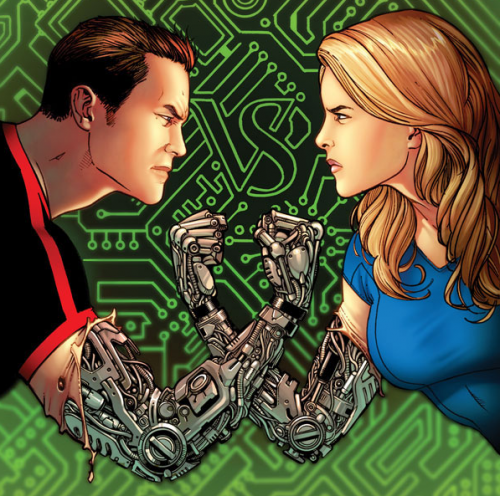Embrace Wearable Technology and Become a Cyborg!

Even today’s young people have heard of Steve Austin, The Six Million Dollar Man, and his girlfriend, The Bionic Woman. After separate accidents, each of them was surgically repaired and enhanced by the government and they became secret agents. Steve Austin could run 60 miles per hour, had arms with the power of a bulldozer and eyes that could zoom like a 20x lens. His love interest, Jaime, had similar capabilities like a bionic ear allowing her to hear at low volumes and different frequencies to most humans. Both of these shows were loosely based on the 1972 Martin Caidin novel, Cyborg.
While true cyborg technology was a far cry from reality in 1970s television land, it is no longer all that far-fetched today. In fact, last year Bertold Meyer, a Swiss psychologist, collaborated with the world’s best roboticists and built a totally bionic man for $1 million. This amazing feat underscores just how far technology has come, and also how much more affordable it is than ever before. Cybernetic organisms–cyborgs for short–are beings that have both biomechatronic and organic parts.
Since the 1970s, work on wearable computing has been ongoing. Including people in the computational processing loop will intertwine them with the technology for good. We are seeing these ideas come to life as robotics engineers are developing devices to extend human physical capabilities, or to replace injured bodily parts. Already, technology is available that fixes sight with the use of tiny cameras and electronic signals, while modified hearing aids work by capturing and applying sound waves to restore hearing. These are amazing breakthroughs for the sight- and hearing-impaired.
Concept pieces made of super-strong exoskeletons and tech-embedded clothing are giving humans increased performance abilities and faster healing from injuries.
For skiers and snowboarders, a heads-up display product, Recon Snow, looks like traditional ski goggles, but offers sports enthusiasts navigation views, speed, and altitude; it also connects to a smartphone via Bluetooth, so skiers can answer calls, read text messages, and play music. The manufacturer, Recon Instruments, has also just released a product called Jet, which will gives cyclists voice control and hands-free use.
Fitness bands like Fitbit, Jawbone, Pebble and Shine have exploded onto the scene, and casual exercisers have embraced them as well as serious fitness enthusiasts. Already, we are seeing employers purchasing the devices to help their employees get in shape and save on health insurance premiums.
Google Glass has probably gotten the most publicity, but there are many other devices available on the market which are poised to force smartphones from the forefront of communications. Samsung has released a watch that is compatible with its smartphones, and Apple is working on one as well. Smaller companies are developing and selling many different styles of transmitting rings, bracelets, gesture-controlled armbands, and smart watches. Clearly, a new paradigm shift is at hand: much in the way that tablets and mobile phones displaced personal computers, and in similar fashion to how mobile devices replaced home phones, new wearable technology pieces are becoming mainstream at a rapid clip.
We are excited to announce that RobotShop has just added a wearable technology product category, and will be adding to it steadily as more pieces and devices come to market! You can already find smart watches, smart clothes (at RobotShop Europe), exoskeletons and a bunch of DIY accessories that you can use to create your own application.
The wearable technology revolution promises to move forward briskly because sensors and chip sets are now cheaper than ever before, making it easier for smaller companies to incorporate the latest technology into wearable devices. Though people seem married to their phones today, they might soon be trading them in for a rocking, hands-free watch, bracelet, ring, or eyeglasses that use voice recognition and camera technology to take care of tasks that were once the domain of personal computers. It is a strange new world indeed. A world in which we embrace more and more wearable technology, a world in which we are going to slowly merge with our technology, where flesh and machine will become one. A world full of cyborgs.
https://www.youtube.com/watch?v=UG_oThcYsn0
Thanks for helping to keep our community civil!
Notify staff privately
You flagged this as spam. Undo flag.Flag Post
It's Spam
This post is an advertisement, or vandalism. It is not useful or relevant to the current topic.
This post is an advertisement, or vandalism. It is not useful or relevant to the current topic.
You flagged this as spam. Undo flag.Flag Post




